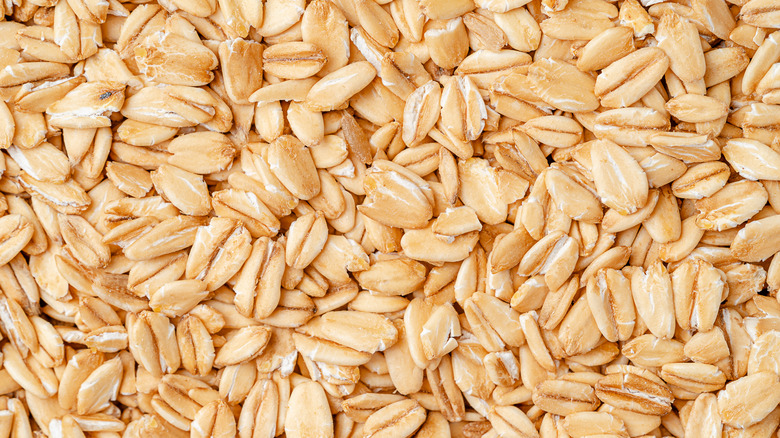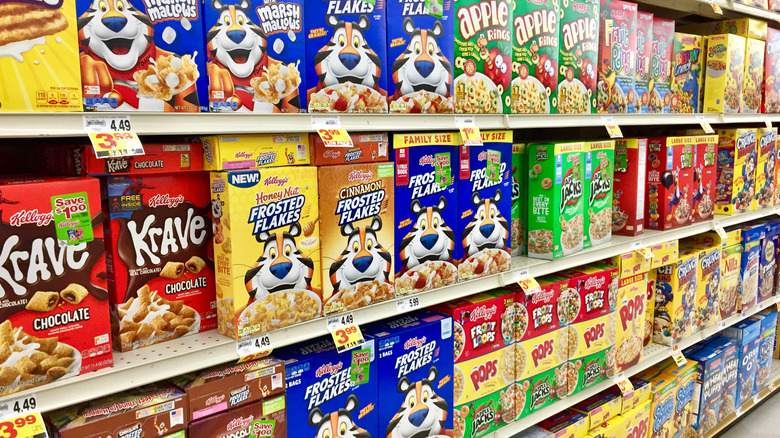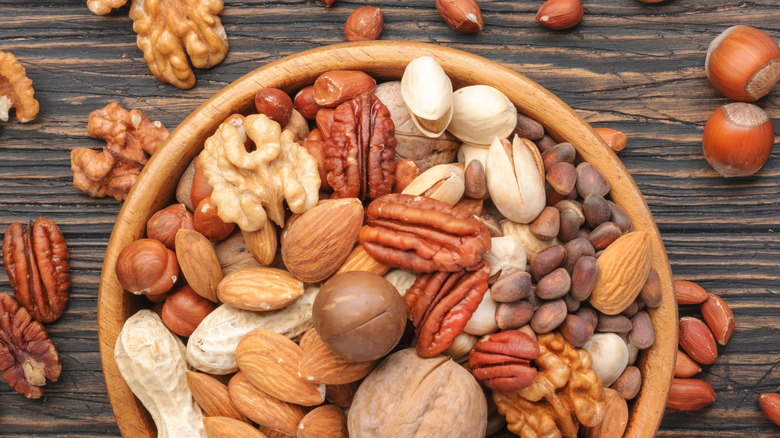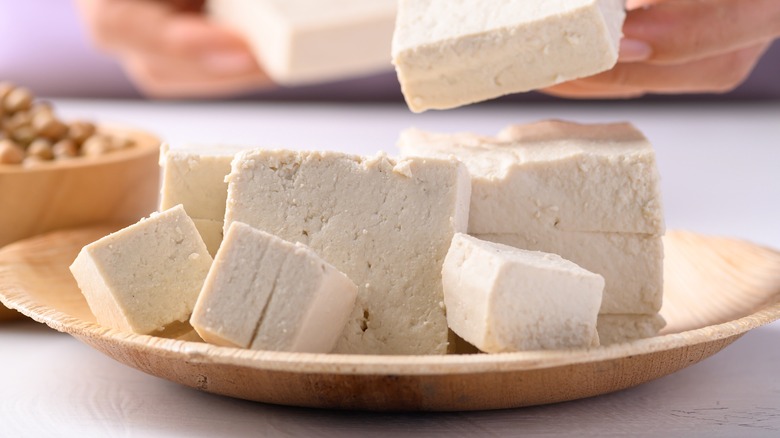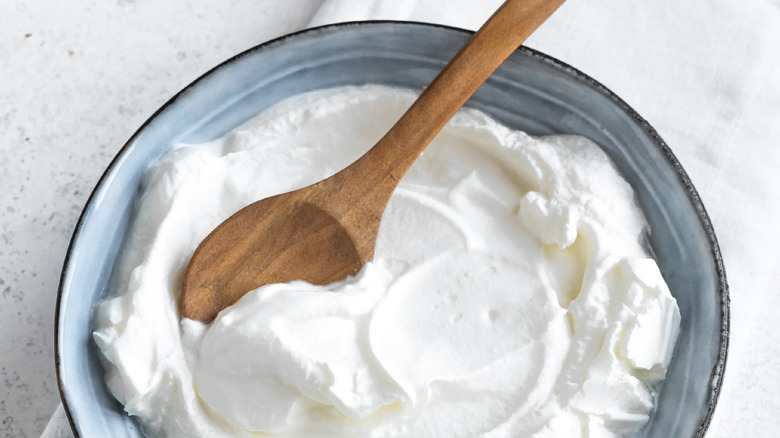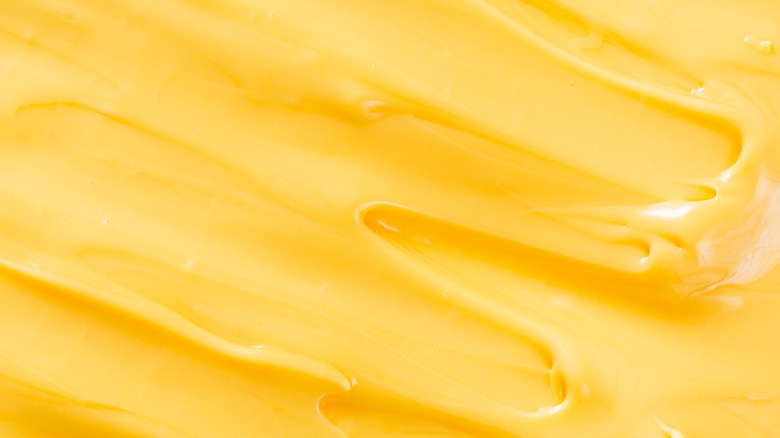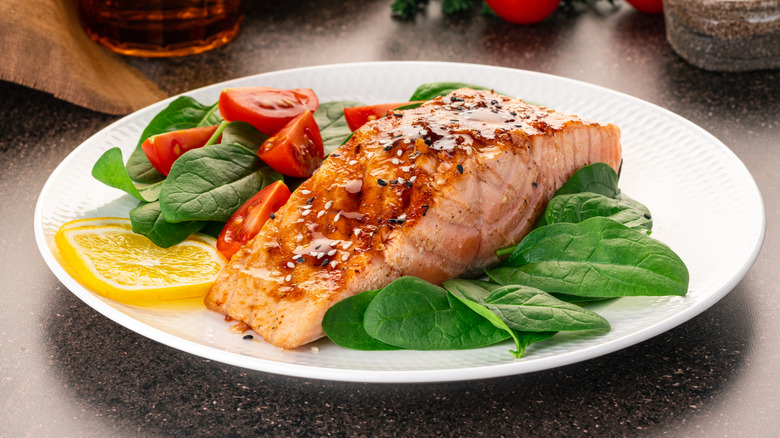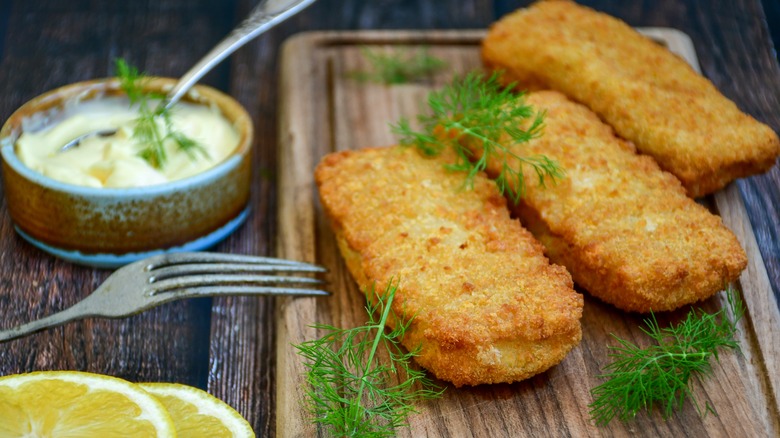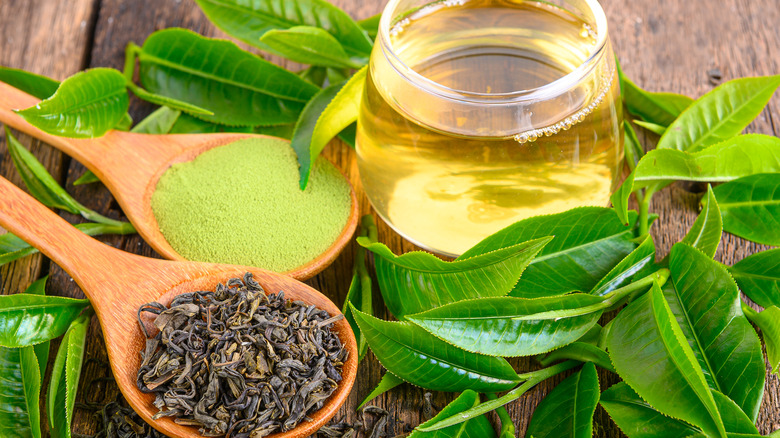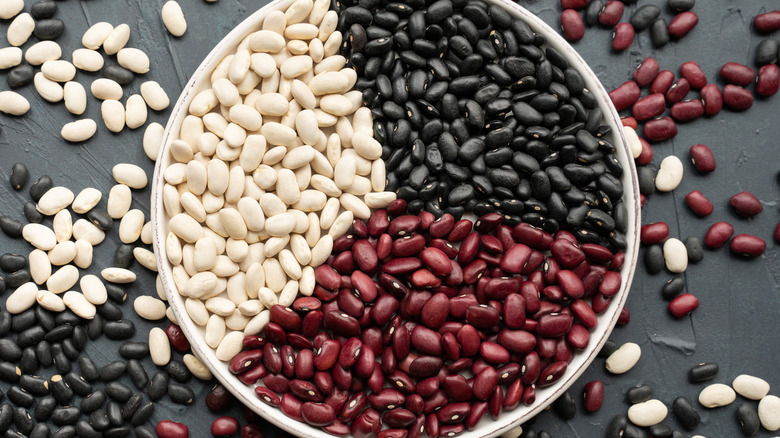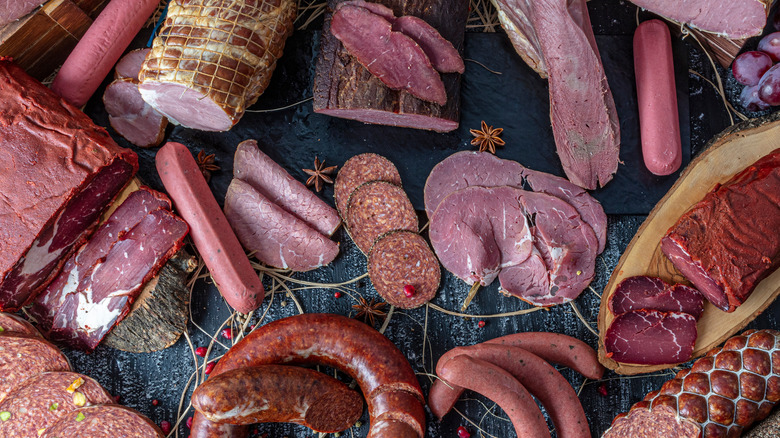7 Best Foods To Eat And 7 To Avoid For Your Cholesterol
Look, we're not going to deny it: Fat tastes great. It makes food taste better, and we all sorta know it. But while we all crave a deep-fried treat or a slab of butter on our toast now and again, like all things in life, having too much of a good thing can have negative consequences. And if you're consuming certain types of fats in too high a quantity, you might find your cholesterol levels rising faster than you'd expect.
Approximately 38% of American adults have higher cholesterol levels, according to a study published in Circulation. And this symptomless condition can lead to a host of negative health consequences, including some profound and potentially life-threatening situations (per the Mayo Clinic). And the worst part is? It's not just fats you have to watch out for. Other foods can cause your cholesterol to rise, even though they may seem harmless or like they have very little fat in them (if at all).
But here's the good news: There are some foods out there that are great for your cholesterol. We've stacked up the good and the bad right here, in one list, so you don't have to search high and low for the info you need.
Eat: Oats
There's a good reason why oats are so beloved by millions of people around the world. Aside from being endlessly delicious (and endlessly versatile), they're also one of the healthiest sources of carbs out there. And those health benefits extend to your cholesterol levels, too. This is thanks to their sky-high fiber levels, and a particular type of fiber called beta-glucan (via Healthline). This could be because when you consume fiber, it turns into a texture that traps cholesterol before it moves into your veins and arteries, explains WebMD. This cholesterol is then digested by your system and ends up in the toilet, not your heart.
Beta-glucan's specific effects on cholesterol were demonstrated in a study published in Nutrients. The study's authors found that when participants consumed beta-glucan derived from oat fibers for eight weeks, their cholesterol levels decreased significantly. And that's not the only way that beta-glucans can boost you in the health stakes. This super-fiber is also full of useful antioxidant compounds, which may fight against free radical damage and the health complications that come with them, like cardiovascular disease and unhealthy inflammation (per Healthline).
Avoid: Sugary cereals
How do you like your breakfast? A little on the sweeter side? Well, for some people, things can get a little too sweet in the form of ultra-sugary breakfast cereals. And while your taste buds might appreciate the stimulation first thing in the morning, your cholesterol levels won't.
Consuming too much added sugar every day can amount to higher bad cholesterol levels overall, as WebMD explains. The more sugar that we eat, the more our livers create low-density lipoprotein or "bad" cholesterol, as well as a general increase in triglycerides throughout our bodies that further raise our cholesterol risk and worsen cardiovascular health.
Given that the average U.S. citizen can eat up to 22 teaspoons of added sugar daily, trying to get rid of those sugary bowls first thing in the morning is a wise choice. Post Golden Crisp is an especially unhealthy choice when it comes to sugar, with 19 grams of added sugar per cup serving (per Built Lean). And don't be fooled by cereals that are marketed as healthy, either. Kellogg's Raisin Bran, for example, delivers a sky-high amount of sugar in each serving — 18 grams per cup, which is more than you'd get in a bowl of Frosted Flakes and Honey Nut Cheerios.
Eat: Nuts
It might seem seriously counter-productive to combat your cholesterol levels by eating more fats, but the fact remains that some high-fat foods and snacks are seriously good for you and your heart. This is the case with nuts, which could be one of the best things you can eat for your cholesterol levels.
The fat that's present in nuts is the unsaturated kind, as Heart UK explains. These types of fats can assist in making our blood cholesterol levels better, and contribute to better heart health overall (per the Harvard T. H. Chan School of Public Health). Nuts are also lower in saturated fats, which are the type that you need to watch out for if you want to keep your cholesterol levels low.
Additionally, nuts are packed with healthy fiber, which can help our bodies process cholesterol better and move it through our system before it gets stuck in all the nooks and crannies we definitely don't want it in. And all of this goodness exists before we get to all of the other great things about nuts nutritionally: They're vitamin- and mineral-rich, provide a source of plant-based protein, and are super filling, preventing us from reaching for less heart-healthy options throughout the day.
Avoid: Baked goods
Baked goods are one of life's deepest joys. Croissants. Doughnuts. Pies. Pies! How could you resist? We certainly can't. But baked goods, while pleasing to your mood, may be less pleasing for your blood vessels.
Part of what makes baked goods so tasty is their reliance on fats like shortening or butter, which are laden with saturated fats, as the Cleveland Clinic states. When we eat higher amounts of saturated fats, it alters our livers' ability to deal with cholesterol, inhibiting the receptors in the organ that filter out cholesterol from working (per Heart UK). We then end up with more cholesterol in our system and, subsequently, in our arteries. Baked goods are also frequently packed with sugar, either in the pastry itself or by being topped with sugary goodness. Higher levels of sugar can equate to higher levels of triglycerides and, again, worse cholesterol.
If you're a fan of baked goods (and who isn't, really), try and seek out versions that use healthier fats or lower amounts of shortening or butter. You should also opt for less sugary pastries to keep your triglyceride levels down.
Eat: Tofu
Honestly, is there anything that tofu can't do? The ultra-healthy plant protein is at home in pretty much any dish you care to throw it in, and it's packed full of healthy stuff. And when it comes to your cholesterol levels, tofu takes the crown once again. Not only is the protein cholesterol-free, but it could even act to lower your "bad" LDL cholesterol levels, according to Medical News Today. This is thanks to the soy isoflavones in tofu, per a meta-analysis published in the American Journal of Clinical Nutrition. The meta-analysis found that across 11 studies, the consumption of soy isoflavones was routinely found to bring down LDL levels in participants, with researchers concluding that they could provide a significant reduction overall.
But even if tofu weren't so incredible for cholesterol, we'd still probably keep it on our plates, thanks to its other unparalleled health benefits. Eating tofu could have a positive effect on kidney function — again, thanks to its soy content — and could also slow down the development of osteoporosis. It may also reduce the risk of developing type 2 diabetes, and could even lessen your risk of developing an age-related brain condition as you get older.
Avoid: White meat
So here's the thing. When it comes to cholesterol, we're frequently told that red meat is the problem, right? But what if we told you that white meat could be just as bad for your cholesterol levels?
A study published in the American Journal of Clinical Nutrition appears to prove just that. The participants of the study were placed on either a low- or high-saturated fat diet, and were then instructed to receive their protein from either red meat, white meat, or plant-based sources. The researchers found that regardless of whether a person was eating more or less saturated fat, both white meat and red meat appeared to raise their cholesterol levels, with not a huge amount of difference in amount between the two meat sources. Yikes.
It's worth pointing out that this study was pretty small, and so further research is needed to determine the exact difference between the two meat sources' effect on cholesterol, if any. What's important to take away from it, though, is that plant-based protein sources could be a much better choice for your blood vessels, with LDL cholesterol levels being lower overall when participants were eating non-meat proteins.
Eat: Yogurt
It's pretty amazing what a few spoonfuls of yogurt can do. Dairy products generally have a pretty bad rep when it comes to cholesterol, due to the often-high levels of saturated fats in items like full-fat milk and cheese. But yogurt, interestingly, appears to be the exception to the rule.
A review published in the journal Foods examined the effect of various dairy items on cardiovascular disease. The review found that although certain dairy products like milk didn't seem to create a significant effect on cholesterol and the heart, yogurt — even the full-fat kind — could actually benefit your heart and your cholesterol.
The key reason for this appears to be the fermented nature of yogurt, with kefir and cheese exhibiting similar effects. This benefit to cholesterol (and its positive implications for heart health) appears to be a feature of fermented foods in general, as a further review published in the Journal of the American College of Cardiology shows. And that's before we're even taking into consideration fermented foods' other benefits to health, which include making your digestive system healthier and making your food more useful nutritionally by increasing the availability of minerals (per BBC Good Food).
Avoid: Butter
Okay, so this probably isn't going to rock anyone's world, but here goes: Butter? It's not great for your cholesterol. (We know — don't shoot the messenger!)
It's important to note, though, that this may only be the case if you're eating higher quantities of the fat, as Healthline points out. Consuming significant amounts of butter, which is rich in cholesterol and saturated fat, could spike your overall LDL cholesterol levels and potentially contribute to poorer heart health, as well as weight gain. Interestingly, though, a review published in the Annals of Internal Medicine found that while consuming cholesterol isn't exactly super-healthy for you, what's more important is how your good and bad cholesterol levels correlate to each other.
However, while this may sound like good news for butter-lovers, it's also really important to vary your fat sources and try as much as possible to prioritize heart-healthy monounsaturated and unsaturated fats. When it comes to replacing butter, this is actually pretty easy: Instead of spreading it on your toast, for example, simply brush your bread with a little olive oil, or substitute vegetable oils in recipes that might call for it, as the Cleveland Clinic suggests.
Eat: Salmon
If we had a dollar for every time someone said "Salmon is healthy!" to us, we'd be rolling in the green by now. Of course, all of those proponents of the oily fish aren't wrong: Salmon truly is a wonder food. And for your cholesterol levels, there are few things better, and it's because of the super-healthy fats that reside in the pink fish.
Salmon is especially rich in unsaturated fats, as Healthline states. These unsaturated fats (which include omega-3, the fat in salmon so prized by health professionals) serve to lower your levels of "bad" LDL cholesterol, and can also help to maintain your "good" HDL cholesterol levels (per the NHS). Naturally, this is great news for your heart and your blood pressure, as lower cholesterol levels mean an easier passage for blood through your system and to your heart valves.
Salmon is also incredibly good for you in a range of other ways, too. It's an excellent source of protein, and is rich in essential vitamins and minerals like B12, D, magnesium, and selenium. Oh, and did we mention it tastes really good, too?
Avoid: Deep-fried fish
There's no denying that deep-fried fish tastes delicious. Wrapped in crunchy batter, dripping with fat, and seasoned to perfection ... Excuse us while we get a towel to wipe our drool off the floor. But while deep-fried fish might be some people's dream food, it's not going to be such a vision for your blood vessels.
Anything deep-fried is usually pretty problematic for cholesterol levels, due to the copious amounts of oil that are used in the process, which then ends up in the food (and in your body). A study published in Scientific African found that deep-fried oils increased not only LDL cholesterol levels, but total cholesterol and triglyceride levels as well, alongside lowering HDL cholesterol levels and contributing to general weight gain.
Not all oils are created equal, though — and if you're deep-frying, it's best to choose a healthier option. Coconut and olive oil are some of the best types of oil out there for deep-frying, with olive oil especially high in healthier monounsaturated fats (per Healthline). Whatever you do, though, steer clear of using canola or corn oil, which can oxidize fat and may prove potentially unhealthy for your body.
Drink: Green tea
There are few things as wholesome as a cup of green tea. And as it turns out, your cholesterol levels might agree. One of the reasons why green tea is so beloved by nutritionists is due to its antioxidant compounds and catechins, as Medical News Today states. These components could have a powerful effect on both total cholesterol and "bad" LDL cholesterol, reducing both in the body. A study published in the Journal of Translational Medicine found that when catechins were mixed with water and consumed, cholesterol levels dropped significantly — although it should be pointed out that this was an animal study, and further research is needed.
These antioxidants and beneficial compounds have further benefits than just for your cholesterol, too. The antioxidants in green tea can aid your body in fighting against free radical damage, which thereby reduces your risk of several chronic conditions, as Healthline points out. Catechins in particular may also prove instrumental in combatting halitosis (that's bad breath to you and me), thanks to their anti-bacterial effect on the mouth. Anything that helps us stop having to worry about that is a winner in our book!
Avoid: Coffee
Coffee may be the perfect drink to ramp up your energy levels, but unfortunately, it may ramp up your cholesterol levels, too. And amazingly, it can depend largely on the way that your coffee's prepared. Coffee contains a compound called cafestol, which can harm your cholesterol by raising your LDL levels (per WebMD). In certain coffee preparation methods, like with a French press or with Turkish coffee, cafestol can make its way directly into your cup.
This doesn't necessarily mean that you have to give up coffee for good, though. Try switching to using a filter instead. As your coffee drips through, the filter grabs the cafestol, preventing you from eventually drinking it. It may also be worth switching to espresso: While cafestol is present in espresso servings, there's generally a smaller amount, so the effect is not as impactful on your cholesterol levels. Instant coffee generally has lower levels of cafestol, too, so if you're a fan of the granules, you have less to worry about (per Healthline).
Eat: Beans
It's hard to overstate how good beans are for you. These plant-based wonders provide you with a serious amount of protein, a truckload of vitamins and minerals, fiber that your body will thank you for, and antioxidants, to boot (per Medical News Today). All hail the bean.
All that fiber is highly beneficial for your cholesterol levels, as Harvard Health Publishing points out. The fiber and protein in beans keep you feeling full for longer periods, which prevents you from eating as much as you normally would. Not only is this good if you're trying to manage your weight, but it could also encourage you to eat fewer foods with saturated fats that might raise your cholesterol levels. The soluble fiber that's so abundant in beans can also assist your body in keeping cholesterol at bay by stopping your system from absorbing it into your bloodstream, says the Mayo Clinic.
Beans can also go a long way toward getting our recommended amount of fiber per day (25 grams daily for women, and 28 grams daily for men, per the Mayo Clinic). One cup of black beans, for example, will provide you with a whopping 15 grams of fiber.
Avoid: Processed meats
Among all the things you should be avoiding if you're trying to keep your cholesterol levels in check, processed meats are pretty high on the list. "Red and processed meat contains saturated fat and processed meats are often high in salt. Eating a lot could raise cholesterol levels and blood pressure, potentially explaining the link to an increased risk of heart disease," explains Victoria Taylor, a senior dietitian for the British Heart Foundation.
One large-scale piece of research, which included data from more than 1.4 million people and examined the link between eating meat and cardiovascular disease, found that eating just 50 grams of processed meat per day could raise your risk of heart disease by 18%.
However, Taylor points out that this doesn't mean that you have to stop eating processed meat entirely; it's just important to keep an eye on your diet in general, and to ensure that it's varied and wholesome. Reducing your intake of processed and red meats and focusing more on plant-based sources of protein could be a great move for your cholesterol, and putting more fruits and vegetables on your plate could help you achieve a much healthier diet.


